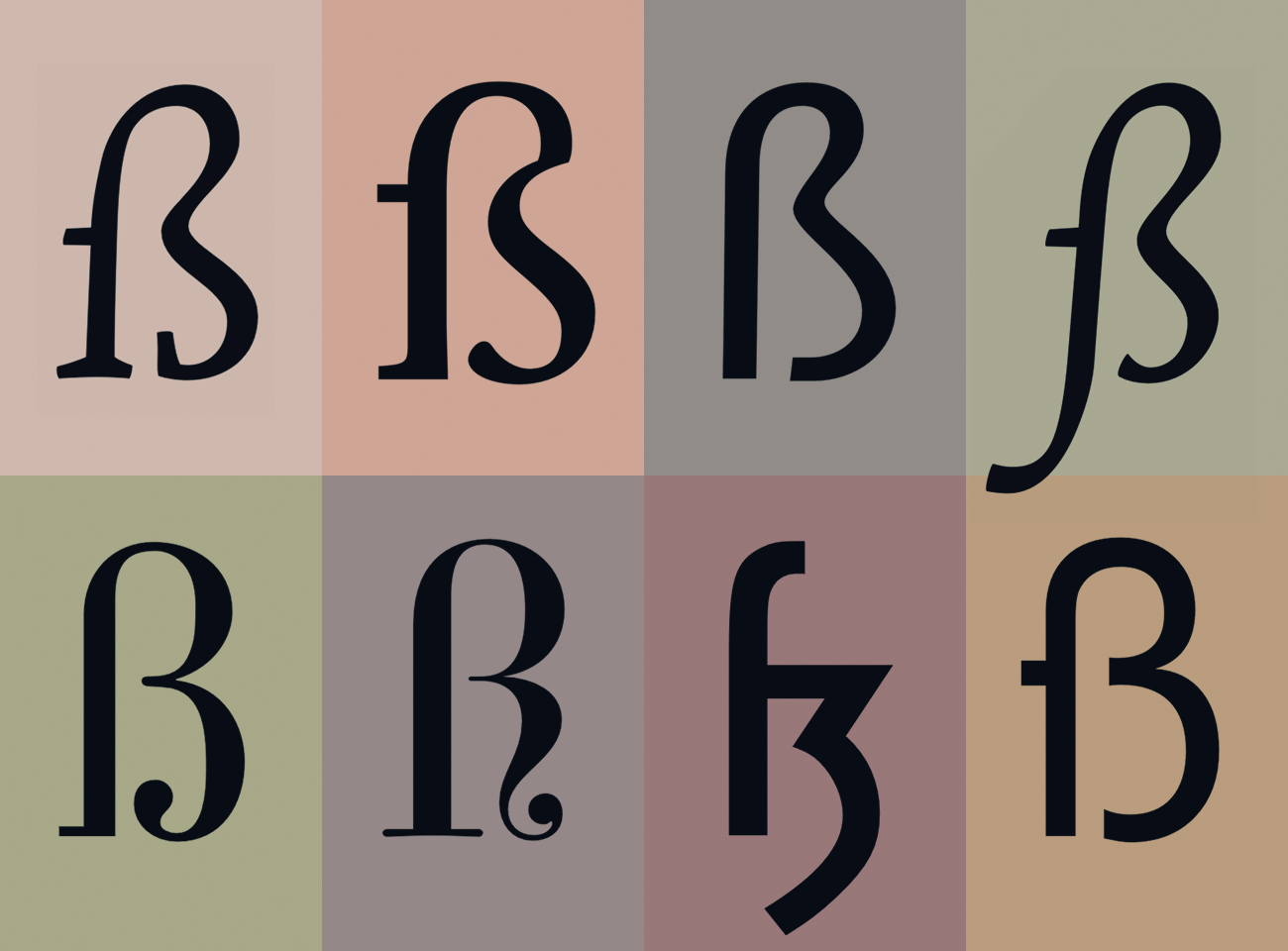Though Mark Twain titled his essay "The Awful German Language", he also had some nice things to say about it:
"Having pointed out, in detail, the several vices of this language, I now come to the brief and pleasant task of pointing out its virtues. The capitalizing of the nouns I have already mentioned. But far before this virtue stands another -- that of spelling a word according to the sound of it. After one short lesson in the alphabet, the student can tell how any German word is pronounced without having to ask; whereas in our language if a student should inquire of us, "What does B, O, W, spell?" we should be obliged to reply, "Nobody can tell what it spells when you set if off by itself; you can only tell by referring to the context and finding out what it signifies -- whether it is a thing to shoot arrows with, or a nod of one's head, or the forward end of a boat."
If there’s one thing German can do, it’s spelling. Even before the spelling reform of 1998, German spelling was always fairly straightforward. Once you have mastered a few simple rules, German is not that difficult.
However, just because the rules are fairly straightforward doesn’t mean that there aren’t any pitfalls for someone learning German for the first time. For example, sometimes there are two different ways to spell the same sound, or else the words are close enough to English that you might be tempted to spell them like English, too.
These fall under the general term of “cognates” - words that looks similar to English because they have a similar stem or origin. However, some words may look like English, but mean something completely different. These are called kissing cognates - like kissing cousins, they are not related closely enough to mean the same thing.


The Neue Deutsche Rechtschreibung
In 1996 a law was passed that went into effect in 1998 reforming German orthography.
It had been talked about for a long time to address certain inconsistencies in German spelling and remains very controversial.
Additional laws were passed in 2004 and the most recent addendum dates from 2017, introducing a capital “ß”.
Any newer textbooks and German vocabulary lists will use modern spelling and grammar, but you may occasionally encounter certain older texts that still use the old spelling - most significant are the changes to the use of “ß” and the virtual extinction of “ph” for the sound “f”.
Capitalising in German Lessons
This is very confusing for people who are trying to learn German fluently for the first time. Not only should words at the beginning of sentences be capitalised, but every single German noun must also be as well. For German language beginners, it is very practical as it makes it easy to recognise nouns, though it is sometimes a little difficult to separate them from proper names, as Mark Twain found out:
"I translated a passage one day, which said that "the infuriated tigress broke loose and utterly ate up the unfortunate fir forest" (Tannenwald). When I was girding up my loins to doubt this, I found out that Tannenwald in this instance was a man's name."
This means, though, that in titles you should only capitalise the nouns and the first word of the title ("Die unendliche Geschichte" von Michael Ende, as opposed to English "The Neverending Story"). This keeps the grammatical identity of each word clear.
Find any information about a German language course here.
Double & Triple Letters in German Compound Nouns

When building the famous German compound words, the letter at the end of one word is often the same as the one at the beginning of the next.
This leads to double letters, such as in the words “Rauhhals” (a sore throat).
When the first word ends in a double consonant, all three consonants are kept: “Schiffahrt” (Schiff + Fahrt, a boat trip).
The German Eszett (ß)
The “Eszett” often stumps people learning German for the first time. The German Eszett originates with an s+z (Ess+Zett) (the old-fashioned s was written much like a "f").
The two were so often written together that they merged into one letter. However, if you have to write a word with Eszett on a non-German keyboard, write it out as a double “s” - “gross”, not “grosz”.
Search for German courses Edinburgh here on Superprof.

This used to be how you wrote the Eszett in uppercase, but just this year (2017), the uppercase Eszett was introduced into German spelling.
One of the great supposed achievements of the new German orthography reform of 1996 was to unify when to write “ß” and when to use a “ss”. Strictly speaking, “ß” follows long vowels while “ss” follows short ones - so stress, with its short “e” in German, should be written “Stress”.
The difference between “Maße” (measurements) and “Masse” (mass) is the length of the vowel, and of course their meaning.
However, it should be noted that there are some exceptions - the word for street should now properly be spelt “Strasse” even though the “a” is long - and the word used to be written “Straße”. Baffled students of German suspect that it was changed to make writing German addresses easier on foreigners.
Learn German colloquialisms and slang to help you integrate to life in Germany and find German learning apps for taking German lessons on your own and learning german online in this blog.
Double Consonants in German Learning
Just like the “ss”, the doubling of a consonant in German shortens the vowel before it. The words “rennen” (to run), “Donner” (thunder), and "Masse” all have short vowels.
When writing German, always think about the length of the vowels. Very short vowels are followed by two consonants - if there is only one consonant sound following, it will be doubled.
A consonant + vowel group, however, will lengthen the vowel before it.
When Does an “H” Follow a Vowel?
When the consonant following it is the last letter of the word, and the vowel is long: “Mahl”, meal. To separate it from “Mal”, time, which has a short “a”, an “h” is added.
The problem with this is that the “h” stays on even when the base word is lengthened - “Mahlzeit” - or with verbs made from the stem. There are other instances where the “h” appears as well that are not quite as evident, but this rule is pretty much universal: “Mahl”, “Kohl”, “Rohr”, “Stuhl”.
Sometimes the reason for the “h” does not seem evident, as the vowel sound is followed by a consonant+vowel group anyway. Try to listen carefully, and you will notice that vowels lengthened by an “h” tend to be slightly longer than those lengthened by a consonant + vowel group.
How to Learn German use of “I” and “IE”
“Ie” is longer than simply “i”. Germans do not generally lengthen “i”s with the letter “h”. Instead, they use “ie” for a long “i”.
Spelling the Sound “SH” in German
Ever wonder why school has that odd letter combination in the beginning? It comes from the German “Schule”, and while English has divided the “sch” combination into two sounds (s+k), in German “sch” is the same sound as English “sh".
When is the sound “sh” not spelled “sch” in German?
When an "s" at the beginning of a word is followed by the letter “p” or "t", “s” is pronounced like “sh”. Therefore, “Spiel” (game), “stehlen” (to steal), and “Beispiel” (example) all are written with a simple “s”.
The German “Ch”
One “ch” sound can easily be confused with “sch” to the untrained ear. It is said forward in the mouth and comes after the letters “i”, “e”, “ie”, “ö”, “ä”, “ü” or a consonant. However, be careful at the end of words, be careful: -ig (”Essig”, “lässig”, “richtig”) is very often pronounced the same as “-ich” (”endlich”, “menschlich”).
Those with -ich at the end are generally adjectives built on a noun. Words ending in -ig can be nouns (”Essig”, vinegar), adjectives (”lässig”, casual) or adverbs or both (”richtig”, correct).
The second “ch” is said in the throat and comes after the vowels “a” and “o”.

Writing the “f” Sound in German Courses
A pitfall for English-speakers learning German are words that use “ph” for the “f” sound - mostly words with Greek roots, such as photograph or dolphin. German used to follow this orthography, but since the spelling reform you use “f”: “Fotograf", “Delfine”. And don’t forget that both “f” and “v” are pronounced like the English “f”!
Using “J” and “Y” in German Spelling
One of the things that often stump beginners learning German for the first time is the use of “j” versus “y”.

It’s quite easy, though:
- Wherever the sound we associated with “y” (as in you, layer, soy) appears in German, it is written with a “j” (Jugend, Soja). Exceptions are the diphtongues “ei” and “ai” - “Ei” (egg), “Meier” (a surname), “Seiende” (existing thing), also the surname “Maier” - where the “i” does the work of English "y".
- The letter “y” in German is pronounced like the letter “ü”. It appears in foreign words, especially of Greek origin. For that reason, words for subjects such as geography or archaeology will not be spelled with a -y, but with “-ie” at the end: “Geographie”, “Archäologie”.
Common Errors in German Spelling
There are some errors that a German teacher will tell you they see all the time and things that you should watch out for when you are learning the language.
Forgetting to Capitalise Nouns When Writing in German
In this age of instant messaging, Tinder and Facebook, many an English professor has lamented the death of the capitalised “I”. And so it is in German, where the impatient youths write their tweets and WhatsApp messages in lowercase. That doesn’t mean it’s correct.
Remember, in German Lessons, all nouns are capitalised, not just proper nouns such as the names of places, countries and people. Adjectives, though, are never capitalised, even when they designate a language or ethnicity.
Names and titles have the first word capitalised, but otherwise follow the rules of grammar, so that a noun in a title is capitalised but an adjective is not: “Die unendliche Geschichte” (The Neverending Story) by Michael Ende, for example, or “Der englische Patient” (the film The English Patient).
In formal usage, you should capitalise the honorific “Sie” - if nothing else, it helps keep it distinct from the third person plural “sie”. Strictly speaking, you should capitalise “Du” in writing even when addressing a friend, but this level of formality has become very rare.
When Do You Use -ich, -ig or -isch in German Adjectives And Adverbs?
Learn about German grammar rules and the exceptions to these rules here.

Should you spell an adjective with -ich or -ig?
Many adjectives and some adverbs in German end in “-ich” - “niedlich”, “kleinlich”, “grünlich” (cute, niggling, greenish); or “endlich”, (finally).
Others end in -ig: “kurzweilig”, “merkwürdig”, (entertaining, weird); or “eilig” (hasty).
Endings in -lich or -ig are pronounced the same (the same “ch” sound as in “ich” or “frech”) and often correspond to the English endings -y, -ly or -ally (or, sometimes, -ish): “wahsinnig” = crazy, “deutlich” = clearly, “endlich” = finally.
Unfortunately, there seems to be no easy way to tell which one is right. If it doesn’t have an “l” - “merkwürdig” (weird) for example - it definitely ends in -ig, but some with an “l” take a “g”, such as “eilig” (hasty).
All adjectives based on a colour end in “-lich” - grünlich, rötlich, gelblich.
Some German adjectives end in -isch
Another group of adjectives ends in -isch: “englisch”, “magisch”, “fantastisch”, “frisch”.
If you are familiar with the words’ pronunciation, this one, at least, is easy to tell apart from the others. -ich and -ig are pronounced the same , whereas -isch is pronounce “eesh”.
The ending in -isch often comes where English uses -ic or -ical: “magisch” - magical; “fantastisch” - fantastical; “konisch” - conical.
When To Use "eu" vs. "äu" For The “oy” Sound in German.
Greulich? Gräulich? Both are correct, and both sound the same when speaking German out loud, but they mean different things. “Greulich” comes from “greulen”, whereas “gräulich comes from “grau”, grey.
When the colour adjective is re-adjectivised, so to speak, it gets an Umlaut: blau - bläulich (blue-blueish), rot-rötlich (red - reddish).
This is also true for other adjectives: dumm - dümmlich (not to be confused with dämlich, which is usually used to curse - “diese dämliche deutsche Sprache!” You can say that someone is dümmlich - a little simple - but calling him “dieser dämliche Mensch” means you’re angry with him.)
“Äu” is generally used when, for some reason, an Umlaut is added to a word with “au”. This can be an adjective as in the examples above, or when forming plurals (Haus-Häuser) or when an adjective or a noun with “au” is made into a verb: Raub-räubern (theft-to rob); sauber - säubern (clean-to clean). In most other cases, the sound “oy” is written “eu”.
German lessons London can help you with the finer points of German spelling.
Welcher Art von Meier sind sie? A Commonly Misspelled German Last Name, and How To Spell It Correctly.
One of the most common spelling mistakes, not only for those learning German but for those who grew up in it, doesn’t concern actual German vocabulary but a last name. The name “Meier” is as common in German as “Smith” is in English and also designates a craft: the “Meier” is the maker of milk products: cream, cheese, and butter.

Regional variants were introduced long before German spelling was codified, and so you will find: “Meier”, “Meir”, “Maier”, “Mair”, “Meyer”, “Mayer”, “Mayr” and “Meyr”. Not to mention that the word can be part of a longer name, such as “Humplmayr”.
So if a colleague, friend or client tells you their name is “Meier”, don’t forget to ask: “Bitte buchstabieren Sie das für mich.” (Please spell it out for me.) Or, if you are in a slightly less formal context: “Welche Art von Meier sind Sie?” (What kind of Meier are you?)
The Proper German Spelling for Academic Subjects

An English speaker learning German might be tempted by the beautiful similarity between the names for the various academic subjects to write them as he would in English, with their -y endings.
However, in German -y is pronounced like “ü”, therefore academic subjects end in -ie, making it: die Geographie, die Archäologie, die Philosophie (you will note that the -ie ending is feminine.)
Learning When To Use “K” vs. “CK” When Writing German Words
Hacken or Haken? Lack? Lakei? Poker? Locker? When do you use a simple “k” and when do you use “ck”?
When learning to speak German, there is usually not that much emphasis put on pronunciation and, even more importantly, listening properly. Why is it important? Because the way words are pronounced helps you know how they are written - and vice-versa.
The general rule is: if a vowel is followed by a vowel+consonant combination, it is longer than when two consonants come after it.
- “Haken”, the hook, is long - only one consonant.
- “Hacken”, to hack (or an implement for doing so) is short, so you need two consonants to ensure it - c+k.

Now you only need to remember which word is which.
Tz? Tzt? When The “ts” Sound Isn’t Written With “z” Or “c”
As if it wasn’t enough that “c” and “z” are both pronounced “ts”, “z” doesn’t often like to hang out alone unless it’s at the beginning of the word. Very often, it invites its friend “t” along for the ride. Usually, the “z” comes after the “t”: Katze (cat), Kitz (fox cub), ätzen (corrode, etch), putzen (clean).
But I, personally, can never remember how to spell the word “doctor”. I even just looked it up just for you: “der Arzt”. See what happened here? The “Z” is suddenly BEFORE the “t”.

And “Letzter”, last, sandwiches the “z” between two “t”s - something that can also happen when you conjugate verbs with “tz” - “er ätzt”, “er putzt”.
Wieder vs. Wider in German
The two words “wieder” and “wider” are so commonly confused that even German native speakers don’t get it. There is even a webpage devoted to the subject: http://wiederwider.de/
- “Wieder” (pronounced veeda) means “again”. “Auf Wiedersehen!” means “(until) we see each other again”, and “Ich komme wieder” means “I’ll be back” - literally, “I come again”.
- “Wider” (vihda), however, means “against”. “Wider willen” means against (someone’s) will, and “widersprechen” to disagree.
So consider whether something is happening again or against something else, and you will know whether to write “wieder” or “wider”.
Learn how the German language differs from place to place and region to region. Why not start lessons across the UK with a tutor. From German lessons London to Belfast, Superprof has you covered.
Summarise with AI:















